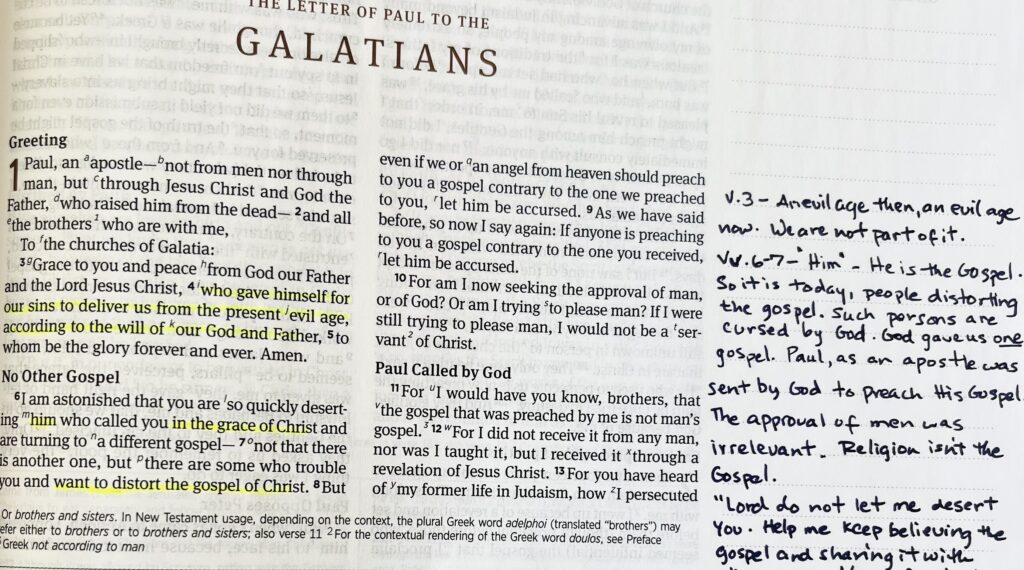
The book or letter to the Galatians was written by Paul the apostle to a group of churches he established in the southern part of Galatia (now modern Turkey) during his first missionary journey (A.D. 46-48). It is probably the earliest of Paul’s letters written around AD 49 just before the Jerusalem Council mentioned in Acts 15. These small churches probably met in homes and not long after becoming believers in Christ came under the influence of Judaizers, who advocated keeping of the Mosaic Law to be a Christian and, and especially being circumcised. This created chaos in the churches. Paul wrote this letter to them to correct this wrong teaching. Unlike today, writing back then was the best communication format when not possible to do it in person. Given in a particular cultural context, writings that make up the Bible, including this letter, are God’s words given to us followers of Jesus. They apply to our own circumstances and our daily lives.
In what we call “chapter 1” (the Bible did not originally have chapters or verses), Paul begins to address the churches of Galatia. In a very direct way, he begins by telling them that he is an apostle, one sent not by men nor “through man” but “through Jesus Christ and God the Father.” This alludes to his conversion and calling which he will later recount on this letter. This also establishes his authority as not coming from himself but directly from “Jesus Christ and God the Father”.
Paul never misses an opportunity to share the Gospel. The Gospel isn’t just a one-time event in the lives of Christians. The Gospel is Jesus, who died and was raised from the dead by the Father. He reminds them that He, the Lord Jesus Christ is the one who gave himself for our sins “to deliver us from the present evil age, according to the will of our God and Father.” It is interesting to note that of course we are saved from our sins through Christ but he also came to “deliver us from this evil age.” In other words, Jesus rescues us from the grip of this evil age. We are no longer under its control. The evil age hasn’t changed. It is still evil. We can call it whatever we want to, but God’s truth is clear. This is an evil age.
Paul goes on to tell them how shocked he is that they have “so quickly deserted him who called you in the grace of Christ and turning to a different gospel” (v. 6). There isn’t another gospel but a distorted “gospel of Christ”. Using strong language of condemnation, he lets them know that even if an angel was to appear and “preach” to them a “gospel contrary to the one we preached to you,” (v. 8), they are to be cursed or doomed in hell. He repeats this twice. This he says, is not to please him, because if he was, he would not be a servant of Christ.
The point is clear. The gospel is one and comes through Jesus Christ and God the Father. This is the gospel Paul preached to them given to him directly “through a revelation of Jesus Christ” (v. 12).[1] This is the one they have believed.
If you are a believer in Christ, you have believed in this gospel. This gospel isn’t man’s invention, it is God’s truth given to us. This gospel has called us to the grace of Christ. In other words, we believe by faith, and it is given by grace not by works. We live by grace. His grace. Adding anything to it dilutes the gospel and makes it a false gospel. To follow “another” gospel is to desert him.
“Lord do not let us desert you. Help us to keep believing the gospel and sharing it with others regardless of what they think of it or what they think of us. May we never seek to please others more than you. Thank you for saving us from our sins and from this present evil age. May the glory be given to you forever and ever, amen.”
[1] He will explain how this happened later in the chapter.